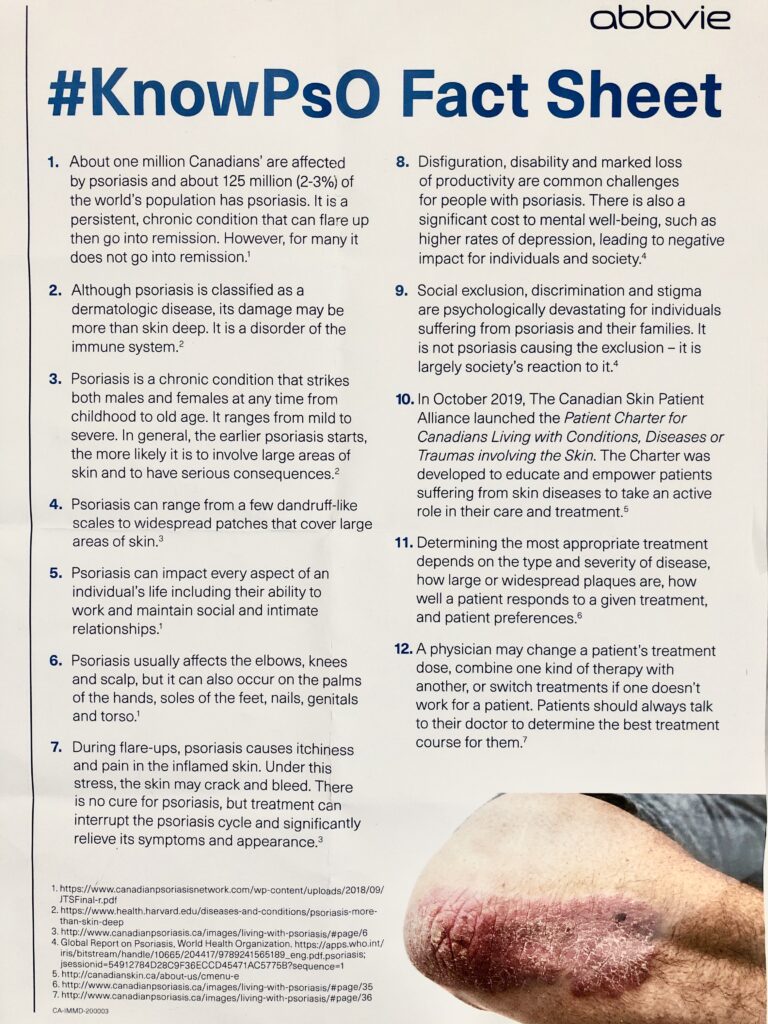 I recently attended a blogger/media event on Psoriasis, hosted by AbbVie. As a blogger, I get invited to various and varied events throughout the year, and this event, called #KnowPsO, was extremely informative.
I recently attended a blogger/media event on Psoriasis, hosted by AbbVie. As a blogger, I get invited to various and varied events throughout the year, and this event, called #KnowPsO, was extremely informative.
First, I should say that I am not a medical expert, so these comments are from the material we received and what I observed. Second, this event is still on my mind. It opened up how I’m thinking about my health and how important it is to listen to and treat your body.
I didn’t know much about psoriasis prior to the event because I don’t have it as far as I know, but I have heard of people living with it.
We had Dr Melinda Gooderham, a dermatologist at The Skin Laser Clinic , talk to us about the impact of proriasis on those suffering from the disease. She spoke about someone who didn’t want to go on a beach vacation because of it. She spoke about how psoriasis can show up in different forms in your body. And, she spoke about treatments that are available and the importance of speaking with your doctor.
The biggest takeaway for me was the link between psoriasis and cardiovascular disease, diabetes, Crohn’s disease, depression, anxiety, and psoriatic arthritis. The link is because psoriasis is an auto-immune disease, which can result in these various diseases. In other words, don’t ignore psoriasis. There are treatments, and the sooner you see your doctor the better.

Psoriasis is a skin condition where the skin cells turn over in 5 days (versus the average of 30 days) resulting in red, patchy, itchy, painful skin. These patches can be small or they can cover your torso. They can be on your scalp, face, hands, nails, feet, etc.
Psoriasis is a chronic condition and it can strike at any time. It’s genetic, so you can’t catch it; you have to have a predisposition to it. It may show up at a younger age, or when you’re in your 50s-70s! It’s triggered by a number of things, including a viral or bacterial infection or a needle poking your skin (like a tattoo).
In case you’re wondering, the difference between eczema and psoriasis is that you can draw a continuous line around the patch of psoriasis on your skin. For eczema, you cannot. Eczema is also always itchy and may wake you up at night, whereas psoriasis does not always do that.
In Canada, about 1 million people are affected and that number is 125 million around the world. Psoriasis can flare up and go into remission, but for many it doesn’t. You can start by applying a thick cream to the area for a couple of weeks to see if you can get it under control. If not, you should see your doctor.
One of the newer treatment options available is a drug called Skyrizi, which inhibits IL-23 (responsible for activating psoriasis). As of February 2020, Skyrizi is now publicly reimbursed in Ontario, Alberta, Saskatchewan, and Quebec. You should see your doctor even if the patch goes away, so you can be tested for related diseases that I mentioned above.
For more information, you can check out these sources:
Canadian Psoriasis Network
Canadian Skin Patient Alliance
Canadian Association of Psoriasis Patients
Please let me know if you found this blog post helpful to you or someone in your family.

 Email This Post
Email This Post